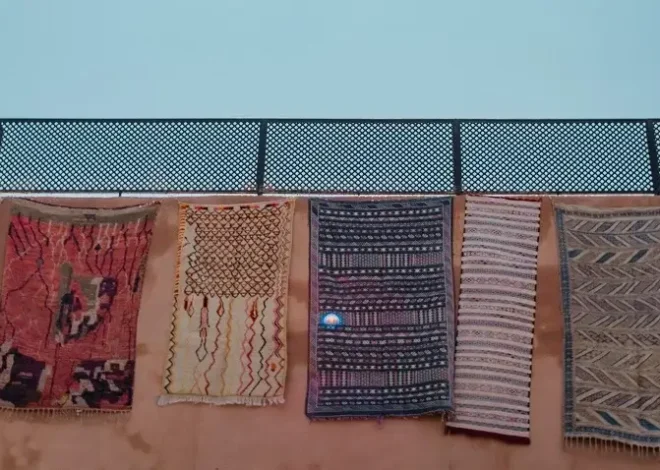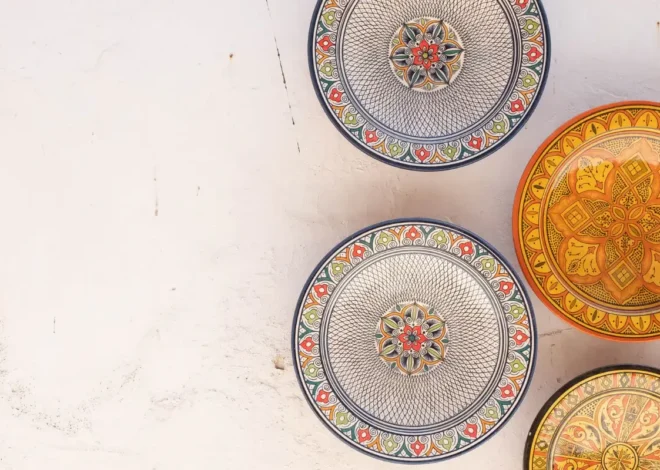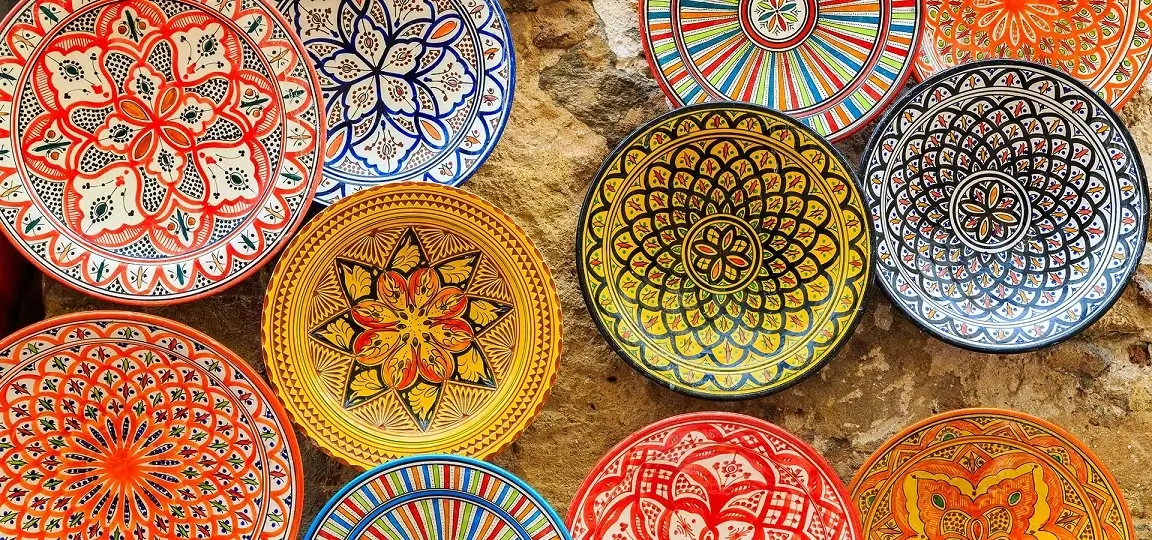
Moroccan Handmade Products: The Rich Heritage
Moroccan craftsmanship is renowned worldwide for its exquisite beauty, intricate designs, and rich cultural heritage. From the crowded markets of Marrakech to the peaceful coastal town of Essaouira, Morocco boasts a diverse array of handmade products that reflect centuries-old traditions. In this article, we’ll delve into the various types of Moroccan handmade goods, the materials used, and the specialities of key cities known for their artisanal crafts.
Through your trip accross Morocco, you’ll encounter a mesmerizing variety of goods, each imbued with history, culture, and the expert touch of the artisans who bring them to life.
Textiles and Carpets:
Moroccan textiles are famed for their intricate patterns, vibrant colors, and skilled craftsmanship. Traditional weaving techniques produce stunning carpets, rugs, blankets, and fabrics adorned with geometric motifs or symbolic designs.
Woven with a blend of tradition and innovation, these pieces showcase the rich cultural tapestry of Morocco. From the vibrant colors of Berber rugs to the geometric patterns of Rbati carpets, each textile tells a story of heritage and artistry.
Skilled artisans use traditional weaving techniques passed down through generations to create these masterpieces. Those artisans often, are using locally sourced wool and cotton dyed with natural pigments. Whether adorning the floors of Moroccan homes or gracing the walls of galleries around the globe, Moroccan textiles, carpets, and rugs captivate with their timeless elegance and enduring appeal. They are not merely decorative items but treasured symbols of Moroccan identity and craftsmanship.
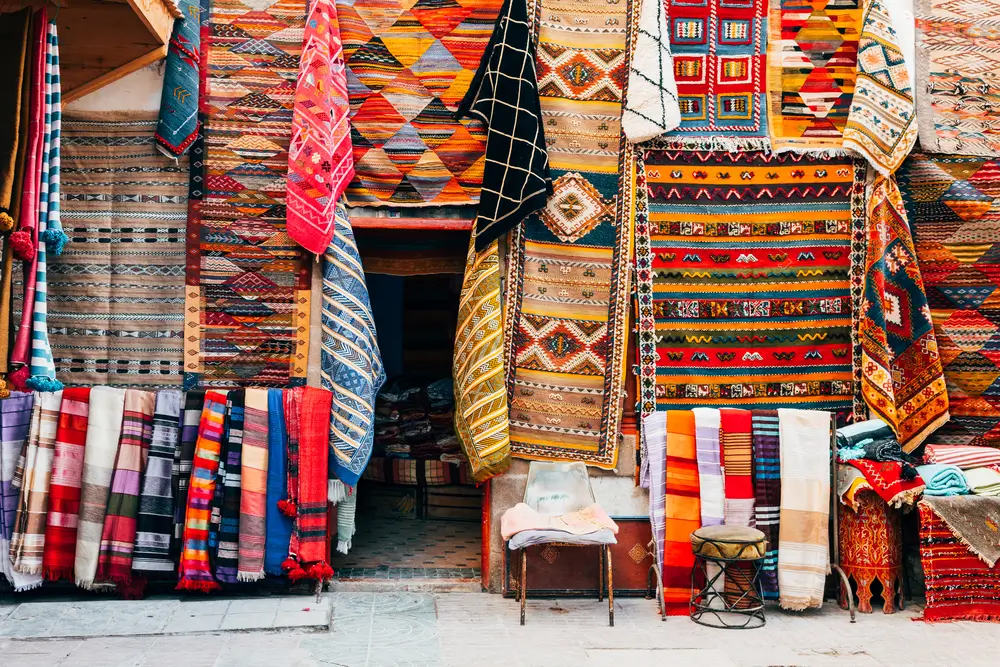
Cities Known for Handmade textile and carpet Products
Rabat, Chefchaouen, Marrakech and Tetouan
Pottery and Ceramics
Pottery has been a cherished art form in Morocco for centuries. From the iconic blue and white ceramics of Fez to the vibrant hues of Safi’s pottery, each region has its own unique style. Moroccan pottery encompasses everything from tagines and tea sets to decorative tiles and vases.
Pottery and ceramics hold a cherished place in Morocco’s cultural heritage and in Moroccan people’s life in general. All that with distinctive styles emerging from various regions across the country. Among the most renowned centers for pottery production are the cities of Fez, Safi and Rabat. In Rabat you can visit the artisan quarter of El Oulja where you can find all kind of Moroccan Handmade products.
In Fez, the ancient medinas are alive with the vibrant hues and intricate designs of traditional Moroccan pottery. Here, skilled artisans carry on centuries-old techniques, handcrafting ceramics adorned with geometric patterns and floral motifs. Fez’s pottery scene is characterized by its exquisite blue and white ceramics, which showcase the city’s rich architectural heritage and artistic prowess.
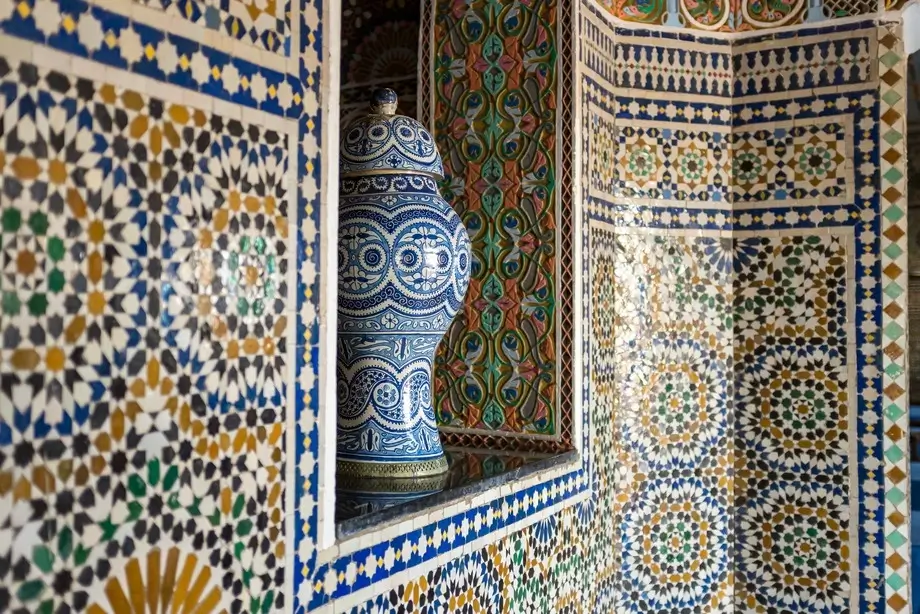
Fez ceramics and traditional Moroccan tiles
Safi, nestled along Morocco’s Atlantic coast, boasts a long-standing tradition of ceramic craftsmanship. Known for its colorful glazes and maritime-inspired designs, Safi’s pottery reflects the region’s coastal charm and seafaring history. Artisans in Safi produce a wide range of ceramics, from intricately painted plates and bowls to decorative tiles and mosaic work.
If you are visiting Safi, don’t forget to visit the Safi National Ceramics Museum. This museum showcases a stunning collection of pottery and ceramics, highlighting the region’s centuries-old tradition of craftsmanship and artistic excellence.
In 2023 UNESCO has officially recognized Safi pottery as part of the world’s cultural heritage, honoring its centuries-old tradition and craftsmanship as an invaluable contribution to humanity.
Safi National Ceramics Museum
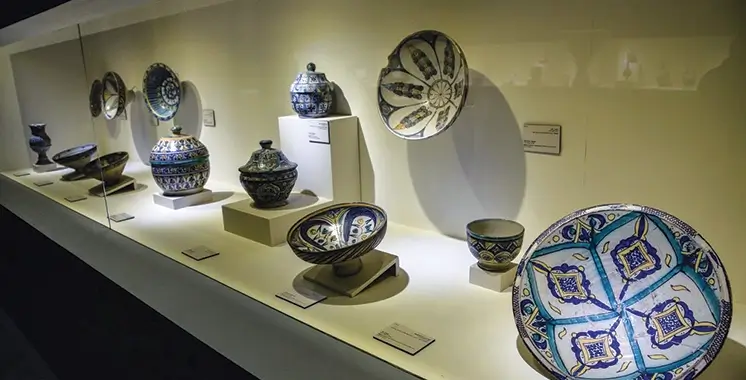
Rabat, the capital city, is home to the historic artisan quarter of El Oulja, where pottery production has flourished for centuries. Here, visitors can wander through bustling markets and workshops, witnessing firsthand the skilled craftsmanship that goes into creating Moroccan ceramics. El Oulja’s pottery is characterized by its contemporary flair and innovative designs, blending traditional techniques with modern sensibilities to produce pieces that are both timeless and unique.
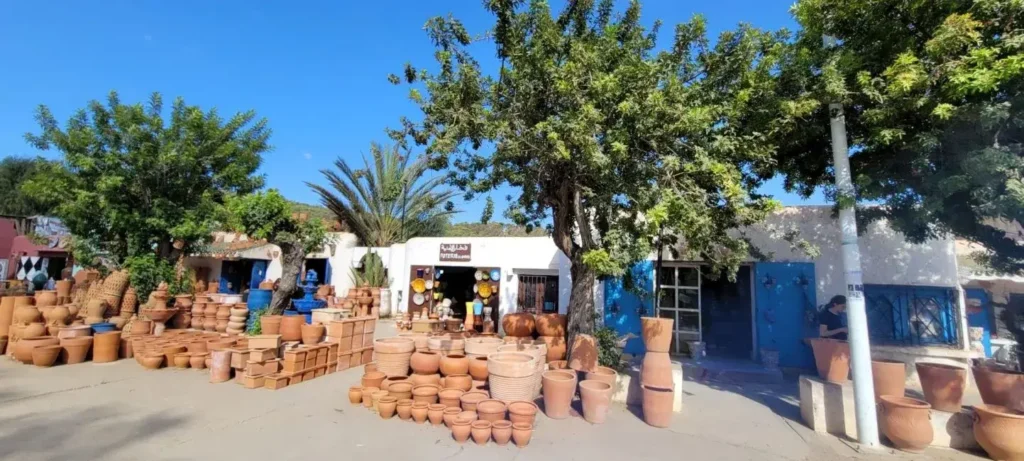
From the ancient streets of Fez to the coastal workshops of Safi and the bustling markets of Rabat’s El Oulja, Moroccan pottery and ceramics continue to captivate with their beauty, craftsmanship, and cultural significance. Each piece tells a story of tradition, creativity, and the enduring legacy of Morocco’s rich artistic heritage.
Cities Known for pottery and ceramics Products
Safi, Rabat, Marrakech, Fez
You can buy Moroccan pottery and ceramics in: www.goodsofmorocco.com with worldwide delivery
Leather Goods
Morocco’s bustling souks are a treasure trove of leather products, including bags, shoes, belts, and poufs. Tanned using natural dyes and age-old techniques, Moroccan leather is celebrated for its durability and timeless appeal.
Renowned globally for their quality and exquisite designs, Moroccan leather goods are a testament to the skill and dedication of the artisans who create them. From the souks of Marrakech to the artisan workshops of Fez or Rabat, leatherworkers meticulously craft a diverse array of products. That includes intricately embroidered bags, sumptuous leather poufs, finely tooled belts, and intricately designed shoes. The tanning process, often done using natural ingredients such as vegetable dyes and olive oil, further enhances the appeal of these handcrafted treasures.
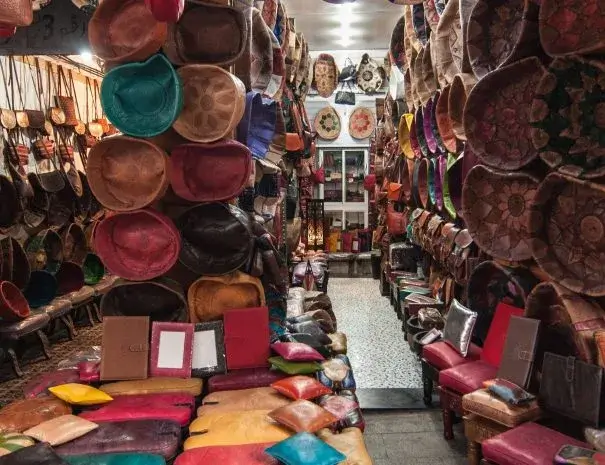
Moroccan handmade leather products shop
Chouara Tannery in Fez, Morocco, stands as one of the oldest and most iconic tanneries globally, dating back over a thousand years. Its distinctive stone vessels filled with colorful dyes and hides create a mesmerizing sight. The tannery offers to it’s visitors a glimpse into the ancient art of leather tanning. The tannery continues to operate using traditional methods. The hides are treated by hand and natural ingredients such as pigeon droppings and vegetable dyes. Chouara Tannery remains a symbol of Fez’s rich heritage and is a must-visit destination for those seeking to immerse themselves in Morocco’s centuries-old craftsmanship.
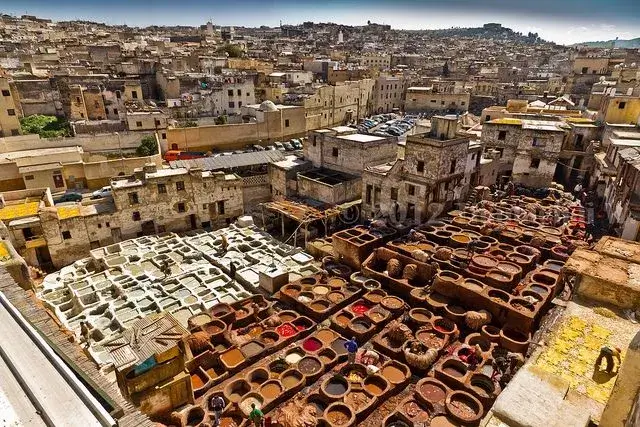
Not only do Moroccan leather goods showcase the country’s rich artisanal traditions, but they also serve as timeless symbols of elegance and craftsmanship. They are specially appreciated by discerning connoisseurs worldwide.
Cities Known for leather Products
Marrakech and Fez
You can buy Moroccan leather goods in: www.goodsofmorocco.com with worldwide delivery
Metalwork and Brassware
Skilled artisans in cities like Fes and Meknes craft exquisite brass lamps, trays, and decorative objects. For that they are using traditional hammering and engraving methods. These ornate pieces often feature intricate geometric Moroccan patterns or Islamic calligraphy.
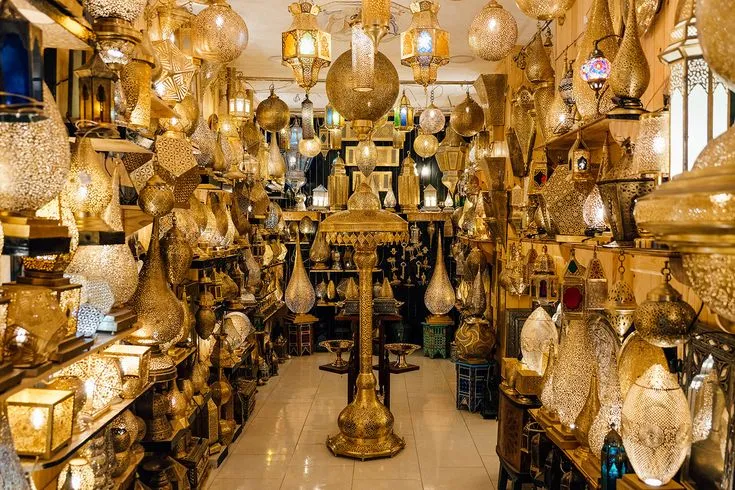
Moroccan metalworkers transform brass, copper, and silver into stunning lamps, trays, teapots, and ornate mirrors. These exquisite pieces often feature intricate geometric patterns, delicate arabesques, or elaborate Islamic calligraphy. These pieces of art reflects the country’s rich cultural heritage and artistic tradition.
Cities Known for Metalwork and Brassware Products
Marrakech, Fez and Rabat
You can buy Moroccan handmade metalic goods in: www.goodsofmorocco.com with worldwide delivery
Handmade Woodwork products
From intricately carved furniture to decorative items like mirrors and screens, Moroccan woodwork showcases the country’s masterful craftsmanship. The aromatic cedar and walnut woods are meticulously carved and embellished with traditional motifs.
Moroccan woodworkers favor woods like cedar, walnut, and olive for their rich colors and durability. They carve them into intricate patterns and designs.
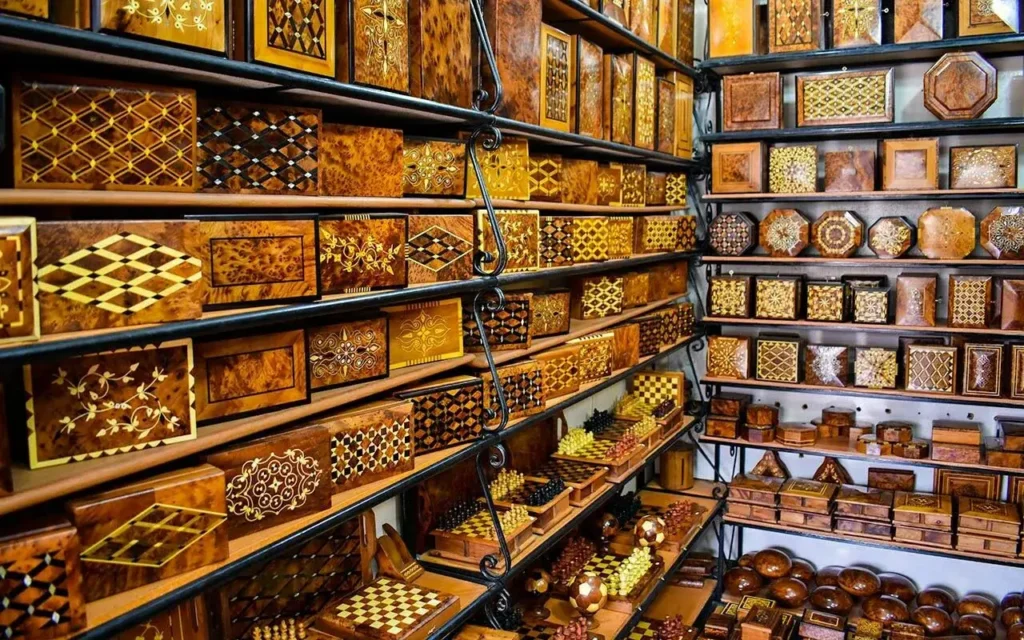
Cities Known for handmade wood Products
Essaouira, Azrou and Chefchaouen
You can buy Moroccan handmade wood products in: www.goodsofmorocco.com with worldwide delivery
Moroccan handmade products are not just commodities; they are a testament to centuries-old traditions, skilled craftsmanship, and vibrant cultural heritage. From the Marrakech to the coastal towns of Essaouira, each city offers its own unique array of handmade treasures. Which is reflecting the diversity and ingenuity of Morocco’s artisanal traditions. Whether you’re admiring a intricately woven carpet or sipping tea from a hand-painted ceramic cup, every piece tells a story of craftsmanship, creativity, and cultural pride.

